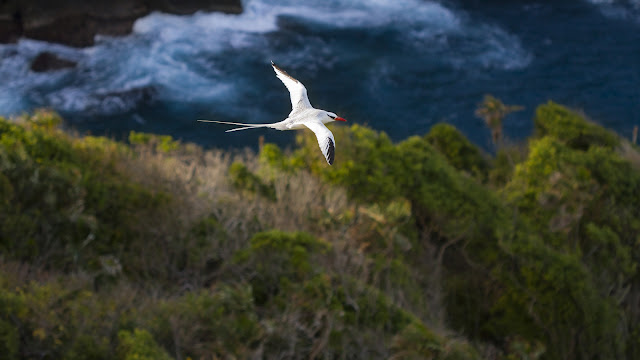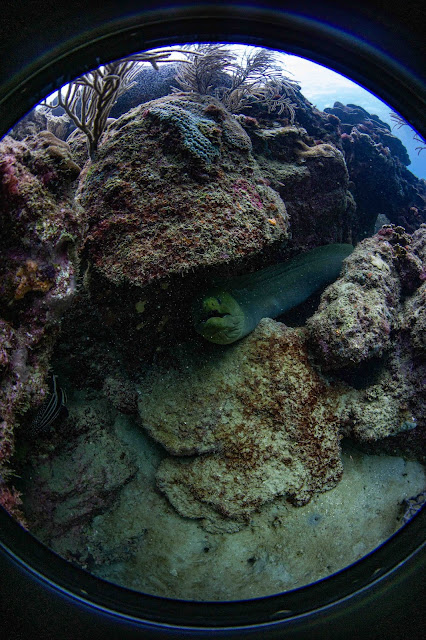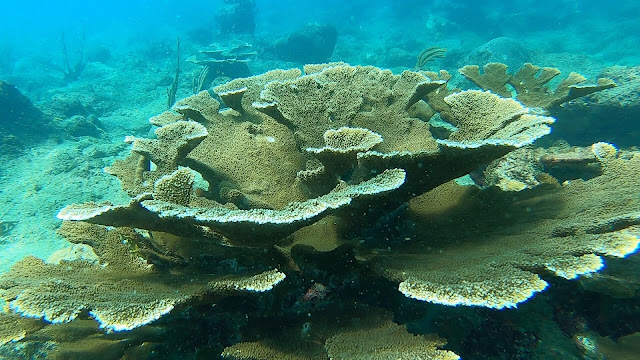On-line Learning Goes Underwater
Now students of all ages are able to explore the coral reefs around Tobago from a smartphone or computer. Dr Anjani Ganase talks with Kelly Mannette Education Officer of the Buccoo Reef Trust about the Maritime Ocean Collection (maritimeoceancollection.com)
After several months of diving to collect the images, and almost a year to apply the technology, the on-line collection of the 360-imagery on Tobago’s coral reefs is available, accessible at maritimeoceancollection.com and through the global collection launched via Google and Underwater Earth. Viewers can “virtually dive” to explore the reefs and focus on what interests them.
The campers of the Sun, Sea and Science Camp in Tobago, in 2019, were among the first children to be introduced to virtually dive the coral reefs of Tobago, as well as coral reefs all around the world. This month, The Maritime Ocean Collection goes live. It is the first collection featuring 360-degree imagery of Tobago’s coral reefs that is now freely available for viewing online.
Kelly Mannette, Education Officer at the Buccoo Reef Trust, has been running the Sea, Sun and Science Summer programme since 2002. Buccoo Reef Trust is an environmental NGO based in Tobago with a focus on the research, conservation and education of the marine environment in Trinidad and Tobago and the wider Caribbean. Her responsibility as the Educational Officer is to disseminate up-to-date information about the marine environment of Trinidad and Tobago and the Caribbean to students and the wider public. Kelly lives in Tobago.
The Sea, Sun and Science Summer programme is a highly interactive summer camp programme, where aspiring scientists get to learn about and explore the many types of marine ecosystems around Tobago and their importance to us. A full week of activities include expeditions to snorkel Buccoo Reef, beach clean-ups and visits to turtle nesting sites. In recent years, Buccoo Reef Trust has partnered with SpeSeas, a local NGO that also focuses on marine science education, to give campers the opportunity to virtually dive coral reefs all around the world. With the development of the Maritime Ocean Collection, she now has the opportunity for her campers to virtually explore the coral reefs found in their very own ocean backyard.
Kelly discusses her experiences on the coral reefs of Tobago and suggests what the Maritime Ocean Collection should mean to coral reef conservation and education.
Where was the first time you dived in Tobago?
My first experience was a very long time ago (she says this with a very big grin). My job keeps me on the land, but I do some snorkeling now and again.
My first dive experience was with Frontier Divers. We dived off Store Bay (in the southwest), on a reef known as Kariwak Reef. Then we dived Diver’s Thirst reef (a reef plateau found along the south side of the island), and the Maverick wreck found off Mt Irvine Bay. I can recall it very clearly as it was such an awesome experience. Tobago’s diving experience has shown me some of the most beautiful coral reefs I have ever seen, and even though I don’t actively dive, I still dream about being underwater and being able to experience it for more than an hour at a time because what is there is beyond your imagination.
Have you “virtual dived” the Maritime Ocean Collection?
The Maritime Ocean Collection allows the regular person, the man on the street, the child in the classroom to get a glimpse of what is below our oceans and what is right here surrounding the islands of the Trinidad and Tobago, as well as the Caribbean. It is an extremely valuable education tool.
I have taught the curriculum for marine sciences at primary and secondary school. And the Maritime Ocean Collection will first of all give the student a glimpse of our coral reefs and thereafter allow us to appreciate the fact that we have these resources, even though we don’t see them on a daily basis. Because we now have these glimpses of our reefs, we can engage the wider public to appreciate and understand what is there. Hopefully, this knowledge and appreciation will lead to putting things in place for protection and conservation of coral reefs for future generations.
What were some of the more interesting things you observed from the Maritime Ocean Collection?
This is a very good representation of the reefs that we have in Tobago and the resources that are there. It highlighted the fishes, and the different species of corals that some of us may never get to see in real life. So, it does bring a visual stimulation to the general public and those using it. What I like about it, it is a very interactive tool. You experience what it could be like to be immersed underwater looking at the various coral reefs in Tobago.
Most students will only know about the Buccoo Reef and some of the more popular coral reefs, but this collection highlights many of the coral reefs, the dive sites that you would not normally hear about and provides detailed views of what you can find there.
We also become aware of some of the negative impacts of humans, as well as climate change on the reefs through this Collection. So it not only highlights the good, but you can also see some of the things taking place on the reefs at that point in time and gives the students an idea of what is actually happening, so that they can now start thinking - maybe I can make a difference or maybe I can do something to help prevent this from continuing and maybe stop it and protect the reefs as well.
What do you think will be the impact of people seeing Tobago’s coral reefs in this way?
The first time I viewed the Collection, my daughter, in preschool at the time, was with me. We were able to use the VR (virtual reality) headsets and to this day, she still speaks about the experience and the presentations about the coral reefs. For me, it is validation that this Collection can reach from the youngest to the oldest person. It shows what Tobago has to offer underwater on its coral reefs. It will create awareness of the whole island environment – not just the beaches - and may inspire more of us to join those persons working in the marine environment behind the scenes to bring this to life.






